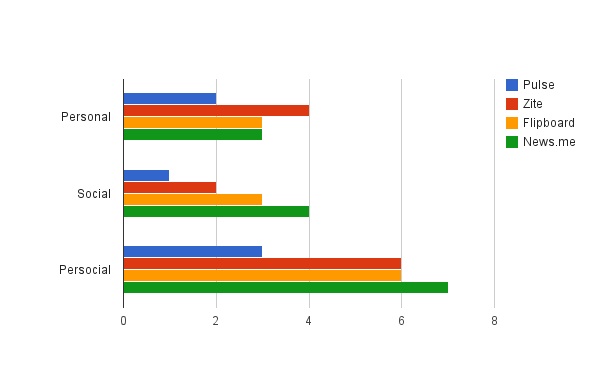Via OWNI.eu
-----
What do Pandora for music, Zite for news, or Amazon for shopping — along with many Silicon Valley startups I’m meeting these days — have in common?
• They are all offering the user a personalized experience by leveraging his/her social network.
• They also provide a social experience in line with every single user’s personal taste and identity.
Overall, there’s an increasing focus on the person and his/her environment versus the simple social media aspect.
These are only the premises of what I would call the persocial web — a new generation of digital products and services where personal and social dimensions melt together to put every person at the center of the game. The consequences of this trend will be extremely broad for the way we approach the Internet both from a sociological and business viewpoint.
A Socratic revolution
A similar kind of re-focus on the individual is physiological for humanity. It happened in the history of philosophy too, when Socrates put the man at the center of his intellectual quest after decades of philosophical thinking about nature, environment and physics.
In general, the fluctuation between holistic and individualistic eras is also very familiar to the history of ideas. Think about what happened in Europe from the 18th century to the 19th and beyond with the Age of Enlightment, followed by the Romantic Era and then by the Naturalistic movement. It’s just a dialectic and continuous evolution.
From the PC to the Social Media era. And beyond.
While these movements embrace more than one hundred years, my generation has already lived many of these ‘eras’ thanks to the time acceleration provided by information technologies.
The personal computer represents for people like me who are in their 30s the very first approach with computer technology. It was a very personal and sometimes solitary experience of writing and gaming. It was all about you. Well, you, the machine and the rest (games, floppy disks, your docs, etc).
Then the Internet came. First, we felt extremely powerless. We could interconnect and learn in the ‘cyberspace’ thanks to email, portals and chats. But we felt disoriented, until the point when Google figured out a way to have the individual navigating easily through all the amount of data, services and content that were out there in a more effective way than portals or email could do. But even at that stage, we lived in a personal web era. It was all about you, your Web browser and the rest. Beyond bi-lateral exchanges, multi-lateral interactions were difficult and sporadic.
Then Facebook disrupted that paradigm by creating a lasting and robust environment for sharing data and nurturing relationships. Our social life was, and is mirrored — sometimes diminished, sometimes augmented — on Facebook. It’s all about you, your social network and the rest.
I believe the next paradigm that is being formed today is going to envision the individual as the real center of a social environment (Facebook). Digital services and products will increasingly ‘talk’ to the individual in a personal way, by guessing his/her tastes and preferences in an intimate and closer relationship. Borrowing an expression from one of my professors at Stanford, Clifford Nass, they will become “adaptive and personalized systems“.
Leveraging what your social network (Facebook) or other random people (Amazon) do, read or buy to generate an experience that is more relevant to you is good. But designing a whole persocial experience is even better. That means taking into account countless personal data: sex, location, age, education, political and religious views, cultural tastes, all sort of affiliations, groups etc. and melting them with your social graph to offer a better user experience.
Facebook OpenGraph or Twitter API already enable such a personalization but its implementation has been so far more focused on real time and very much instant data (the feed of articles that my friends or people I follow read) than on more long-run information about my tastes (taking into account who I actually am, my background, sex, location etc.).
Towards a persocial news experience?
In the news industry, for instance, many are the news readers that are offering to improve the news experience by persocializing it. I tried to rate them by their personalization (1 to 5 points) and socialization (1 to 5 points) effort.

Thanks to its great feature on ‘what my friends are reading,’ News.me, developed by Betaworks and The New York Times, is so far the more persocial news reader, and also the only paid app among the ones we’re analyzing here. In reality, it offers a more social than personal experience. The best personalized features are so far provided by Zite, a Canadian news reader for the iPad, which recently received a ‘cease or desist’ letter from several U.S. publishers. While Flipboard is a fair trade-off in terms of persocialization, Pulse, conceived by smart Stanford students, is intentionally closer to a traditional and yet very clean news reader experience.
Overall, an iPad app that would combine the social features of News.me with the personalization of Zite, would probably be fully persocial.
In general, these new ventures are all part of an overall phenomenon that will reshape the way we consume and engage with web products and services. New privacy issues will raise of course but overall, thanks to persocialization, the web user will become a person again.
—
Photo Credits: Flicke CC Johan Larsson

